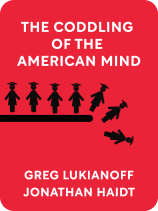

This article is an excerpt from the Shortform book guide to "The Coddling of the American Mind" by Greg Lukianoff and Jonathan Haidt. Shortform has the world's best summaries and analyses of books you should be reading.
Like this article? Sign up for a free trial here .
How is the “us versus them” mindset causing a quest for ideological purity in colleges? Why is it so important to have diverse viewpoints?
In their book, The Coddling of the American Mind, Jonathan Haidt and Greg Lukianoff believe that many colleges today are trending towards ideological purity rather than diversity. They state that this way of thinking can lead to persecution of those who are perceived to be dissenters and can lead to intimidation and fear.
Keep reading to learn why ideological purity in colleges is dangerous.
Orthodoxy and Groupthink on Campus
If speech with which one disagrees is a form of violence, then it logically follows that a community would seek to suppress such “violence” in the name of community safety. After all, no community or group would tolerate open displays of physical violence—so why should speech violence be treated any differently?
The Quest for Ideological Purity
The French sociologist Emile Durkheim, who wrote during the 19th and early 20th centuries, argued that the natural human tendency toward tribalism and “us versus them” thinking often expresses itself through the fostering of internal group cohesion and the suppression of dissent.
This quest for ideological purity tends to be strongest during moments where the group feels itself under siege both from internal disunity and external threats. According to Durkheim, participation in group rituals and public affirmations of shared belief are powerful tools for the achievement of internal cohesion.
Unfortunately, this can quickly lead to the establishment of group orthodoxy and persecution of those who are perceived to be dissenters. These episodes of persecution nearly always:
- Arise seemingly out of nowhere
- Persecute alleged offenders for the most trivial of offenses against the group or collective
- Intimidate those who might be opposed to the persecution into silent acquiescence or even active participation, for fear of being targeted themselves
One can see similar patterns of thinking among today’s students on American college campuses, with their eagerness to root out and silence perceived ideological deviations.
The Need for Viewpoint Diversity
Although we’ve focused a lot on the attitudes of students, they are by no means the sole perpetrators of this groupthink mentality on campus. In many ways, they are merely responding to the growing uniformity of opinion among their professors.
While professors have always leaned left (especially in the humanities and social sciences), leftist academics have gained a dominant position within academia, far outnumbering conservative or right-leaning professors—often by margins of five-to-one.
As opinion within academic circles has grown more uniform, it has become less tolerant of diverging viewpoints. This lack of viewpoint diversity is antithetical to the scholarly and intellectually stimulating environment that is supposed to define university life.
It is certainly true that everyone, including university professors and researchers, believes that their opinions are correct. Because we believe this, we tend to engage in confirmation bias, seeking out evidence that confirms our beliefs, while ignoring evidence that contradicts our beliefs.
But in an academic setting featuring a healthy diversity of viewpoints, rigorous peer review of a professor’s writing and research holds this impulse in check—essentially, the faculty’s confirmation biases cancel each other out. In such a well-functioning marketplace of ideas, it is difficult for rigid orthodoxy and groupthink to take hold.
But the exploration and vetting of diverse ideas are impossible under the conditions of strict ideological uniformity that exist on today’s college campuses. Scholars increasingly evaluate one another’s work not on its merits, but on the basis of whether or not it deviates from shared left-wing orthodoxy. As we’ll see, this growing intolerance for ideological impurity creates an environment where professors are vulnerable to witch hunts—often led by their colleagues.

———End of Preview———
Like what you just read? Read the rest of the world's best book summary and analysis of Greg Lukianoff and Jonathan Haidt's "The Coddling of the American Mind" at Shortform .
Here's what you'll find in our full The Coddling of the American Mind summary :
- The "three Untruths" that have taken hold of young people
- The damage that "speech codes" cause on college campuses
- How colleges are increasingly seeing students as customers






